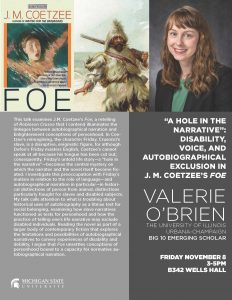619 Red Cedar Rd
Boone, NC 28607
USA

Please mark your calendars for the campus visit of Big10 Emerging Scholar Valerie O’Brien, visiting from the University of Illinois on November 7 and 8.
The Big 10 Emerging Scholars Program—now in its second year—seeks to provide a platform for the work of emerging graduate student scholars in Big10 Departments of English. Each year, we host a scholar from one of our peer institutions, and one MSU graduate student is selected as a visiting scholar in turn.
Valerie has research interests in disability studies and animal studies. She will be participating in the HIVES Research Workshop on Nov 7th, from 4-6pm in Wells C607. On Friday, November 8th, from 3-5pm, Valerie will give a talk to the Department in Wells B342. Please attend and support our efforts to mentor graduate students.
This talk examines J.M. Coetzee’s Foe, a retelling of Robinson Crusoe that I contend illuminates the linkages between autobiographical narration and Enlightenment conceptions of personhood. In Coetzee’s reimagining, the character Friday, Cruso(e)’s slave, is a disruptive, enigmatic figure, for although Defoe’s Friday masters English, Coetzee’s cannot speak at all because his tongue has been cut out; consequently, Friday’s untold life story—a “hole in the narrative”—becomes the central mystery on which the narrator and the novel itself become fixated. I investigate this preoccupation with Friday’s mutism in relation to the role of language—and autobiographical narration in particular—in historical distinctions of person from animal, distinctions particularly fraught for slaves and disabled subjects. My talk calls attention to what is troubling about historical uses of autobiography as a litmus test for social belonging, examining how slave narratives functioned as tests for personhood and how the practice of telling one’s life narrative may exclude disabled individuals. Reading the novel as part of a larger body of contemporary fiction that explores the limitations and possibilities of autobiographical narratives to convey experiences of disability and debility, I argue that Foe unsettles conceptions of personhood bound to a capacity for normative autobiographical narration.
